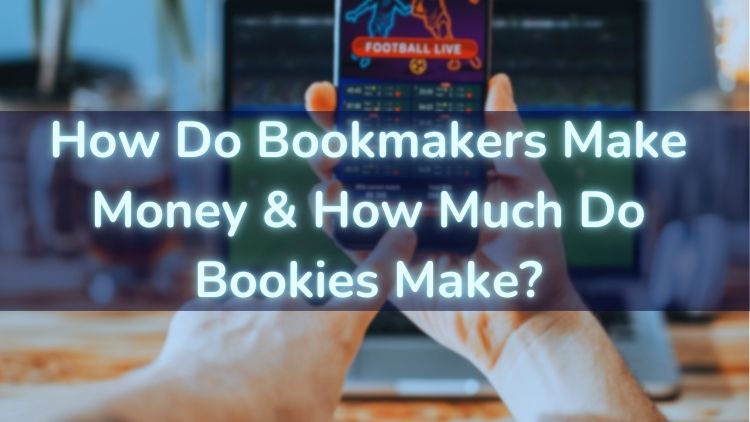
Ever wondered how bookmakers stay in business and manage to make profits? Understanding the ways bookies earn money can help you grasp why operating a business in an industry based around chance isn't a doomed venture.
Bookmakers use several strategies to make sure they come out ahead. They set odds that are in their favour, take a cut from the bets they take in, and balance their books to minimise risks.
In this blog post, we'll break down these methods in an easy-to-understand way. You'll learn exactly how bookies make their money and get an idea of potential earnings.
How Do Bookmakers Make Money?
Bookmakers have a few key ways to ensure they stay profitable, and it all boils down to how they manage bets and set odds. Let's look at some of the main methods they use.
Backing & Laying Bets
When you place a bet, you're "backing" a particular outcome. Bookmakers, on the other hand, "lay" this bet. This means they cover the opposite side of your bet. By balancing the amount of money they take in on different outcomes, bookies aim to make sure they have a steady profit, no matter what the result is.
Adjusting Odds
Bookies frequently adjust odds based on several factors, including how much money is being placed on each side of a bet. If a large number of bets come in on one outcome, a bookmaker might lower the odds for that outcome and increase them for the opposite and other outcomes. This encourages more balanced betting and can help reduce their risk.
Overround Principle
The overround is a clever way bookies ensure they make a profit. Essentially, it's a built-in margin within the odds offered. For example, if the true odds of an event are 2/1, a bookie might offer 9/4 instead. This small difference might not seem like much, but it adds up over many bets, guaranteeing the bookmaker a profit over time.
By employing these strategies, bookmakers make sure that they consistently earn money while offering reasonable betting opportunities to the public.
Bookies Profit Margin
The profit margin for bookmakers, often known as the "overround", is a critical part of their business model. This margin ensures that bookies make a profit regardless of the outcome of the bets placed.
When setting odds, bookmakers slightly adjust them in their favour. For example, if the true probability of an event occurring is 50%, the odds should be 2.0 in decimal format. However, a bookmaker might offer odds of 1.9, which gives them a margin.
This margin might seem small, but across many bets and events, it adds up significantly. It's essentially the bookie's built-in commission on each bet placed.
By carefully managing this profit margin, bookies ensure they maintain a steady stream of income. Understanding this concept helps you see how bookies manage to stay afloat when dealing with events of chance.
How Much Do Bookies Make In The UK?
The earnings of bookmakers in the UK can vary quite a bit from one company to another. However, many large bookmaking companies are quite profitable, often making millions yearly.
Bookmakers benefit from multiple revenue streams, including sports betting, casino games, and other gambling activities. By setting odds in their favour and managing risk through various methods, they typically ensure a steady profit.
While smaller, independent bookies might not see the same huge profits as large firms, they can still make a good income if they manage their operations well. Generally speaking, bookmaking is considered a successful business, thanks to the calculated strategies bookies use to minimise risks and maximise gains.
Do Bookmakers Ever Lose Money?
Yes, bookmakers can and do sometimes lose money. Despite their best efforts to manage risk, there are occasions when the outcomes of events don't go in their favour.
One reason for this is the nature of sports and other events, which can be unpredictable. Unexpected results can lead to significant payouts, especially if many bettors backed the underdog.
Another reason is the sheer volume of bets. If a large number of people bet on the same outcome and it happens, the bookmaker may have to pay out more than they took in from losing bets.
However, these losses are usually short-term. Bookmakers rely on their long-term strategies, including adjusting odds and balancing their books, to ensure they overall stay profitable. In the end, their methods are designed to cover occasional losses and keep their business thriving.
Is Being a Bookie Worth It?
Being a bookie can be profitable, but it's not without its challenges. Let's look at some factors to consider if you're thinking about entering the industry.
Profit Potential
Bookmakers have the potential to earn significant amounts of money, especially larger companies that operate on a wide scale. Smaller, independent bookies can still make a good living if they manage their business well and attract a steady stream of customers.
Risk Management
Effective risk management is crucial for bookies. The ability to balance bets and adjust odds is key to minimising losses and ensuring profitability. This involves understanding market trends and making smart decisions.
Regulatory Requirements
Operating as a bookie comes with strict regulatory requirements, especially in the UK. Adherence to regulations set by bodies like the UK Gambling Commission (UKGC) is essential to operate legally and maintain a good reputation.
Initial Costs and Competition
Starting a bookmaking business requires some initial investment, including setting up a platform, obtaining licences, and marketing. The competition is also stiff, with many established names in the industry.
Overall, being a bookie can be worth it if you are prepared for the challenges and can effectively manage risks. Regularly learning and adapting to changes in the market helps in staying competitive and profitable.
